

Phonemic Awareness: Assessment. Assessment Assessing Phonemic Awareness Phonemic awareness should be assessed from the beginning of kindergarten through the spring of first grade.
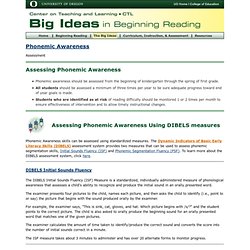
All students should be assessed a minimum of three times per year to be sure adequate progress toward end of year goals is made. Students who are identified as at risk of reading difficulty should be monitored 1 or 2 times per month to ensure effectiveness of intervention and to allow timely instructional changes. Phonemic Awareness skills can be assessed using standardized measures. DIBELS Initial Sounds Fluency The DIBELS Initial Sounds Fluency (ISF) Measure is a standardized, individually administered measure of phonological awareness that assesses a child's ability to recognize and produce the initial sound in an orally presented word. The examiner presents four pictures to the child, names each picture, and then asks the child to identify (i.e., point to or say) the picture that begins with the sound produced orally by the examiner.
Generating Rhymes: Developing Phonemic Awareness. ReadWriteThink couldn't publish all of this great content without literacy experts to write and review for us.
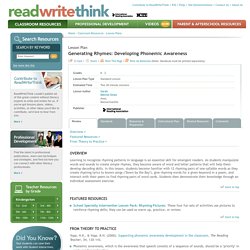
If you've got lessons plans, videos, activities, or other ideas you'd like to contribute, we'd love to hear from you. More Find the latest in professional publications, learn new techniques and strategies, and find out how you can connect with other literacy professionals. More Teacher Resources by Grade Your students can save their work with Student Interactives. More Home › Classroom Resources › Lesson Plans Lesson Plan Overview Featured Resources From Theory to Practice Learning to recognize rhyming patterns in language is an essential skill for emergent readers. Back to top School Specialty Intervention Lesson Pack: Rhyming Pictures: These four fun sets of activities use pictures to reinforce rhyming skills; they can be used as warm up, practice, or review.
Building Phonemic Awareness With Phoneme Isolation. ReadWriteThink couldn't publish all of this great content without literacy experts to write and review for us.
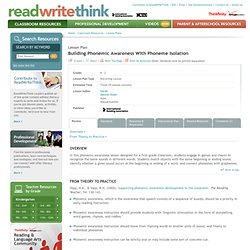
If you've got lessons plans, activities, or other ideas you'd like to contribute, we'd love to hear from you. More Find the latest in professional publications, learn new techniques and strategies, and find out how you can connect with other literacy professionals. Phonemic Awareness Assessment.pdf. Phonemic Awareness Assessment. Phonemic Awareness Assessment Tools. Recognizing Rhyme Assessment Here are two different versions of the Rhyming Assessment tool: Recognizing Rhyme Assessment NO QuickTime movie version Recognizing Rhyme Assessment QuickTime version: Watch Patti do a demonstration of the rhyme assessment.)
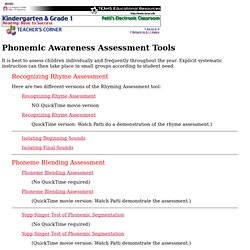
Phonemic Awareness. Phonemic Activities for the Preschool or Elementary Classroom. This article features activities designed to stimulate the development of phonemic awareness in preschool and elementary school children.
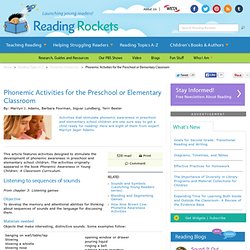
The activities originally appeared in the book Phonemic Awareness in Young Children: A Classroom Curriculum. Listening to sequences of sounds From chapter 3: Listening games Objective To develop the memory and attentional abilities for thinking about sequences of sounds and the language for discussing them. Materials needed Objects that make interesting, distinctive sounds. Activity In this game, the children are challenged first to identify single sounds and then to identify each one of a sequence of sounds. Once the children have caught on to the game, make two noises, one after the other. How Now Brown Cow: Phoneme Awareness Activities. Research indicates a strong relationship between early phoneme awareness and later reading success, and it links some reading failure to insufficiently developed phoneme awareness skills.
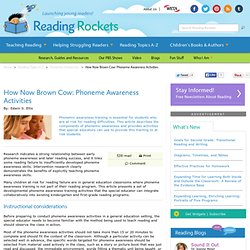
Intervention research clearly demonstrates the benefits of explicitly teaching phoneme awareness skills. Many children at risk for reading failure are in general education classrooms where phoneme awareness training is not part of their reading program. This article presents a set of developmental phoneme awareness training activities that the special educator can integrate collaboratively into existing kindergarten and first-grade reading programs. Instructional considerations Before preparing to conduct phoneme awareness activities in a general education setting, the special educator needs to become familiar with the method being used to teach reading and should observe the class in action. Phoneme awareness activities work well in classrooms where teachers implement shared reading. Literature. Phonemic Awareness in Young Children. Patti's Activities.
Multisensory_Tips_PhonAw-CVC. Lesson Idea To Teach Phonemics To Kindergarten Students. Phonemic Awareness. Building Phonemic Awareness With Phoneme Isolation.